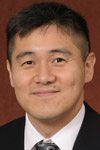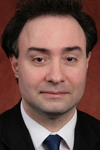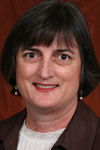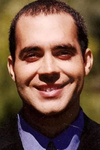
|
FACULTY NEWS |
||
|
Read about the Akash Gunjan work that has been included among the nation’s top papers in Faculty of 1000 Biology, in Top Stories.
The research of Amy Wetherby, Ph.D., director of the Autism
Institute, was mentioned by
George "Scottie" Whiddon, M.D., clerkship faculty member for the Tallahassee campus, and Greg Sloan, M.D., preceptor for that campus, have been recognized by the Diabetes Master Clinician Program of the Florida Academy of Family Physicians Foundation as Diabetes Master Clinicians, and their offices have been designated as Diabetes Centers of Excellence. That recognition indicates they have participated in the program for at least one year and have demonstrated a significant increase in the number of patients achieving evidence-based goals.
Xavier Sevilla, M.D., pediatrics clerkship faculty member for the Sarasota regional campus, has been appointed to serve on the Agency for Healthcare Research and Quality National Advisory Council. He was appointed by U.S. Department of Health and Human Services Secretary Kathleen Sebelius. The council provides advice and recommendations to the secretary and director on priorities for a national health services research agenda. Sevilla is chief of pediatrics at Whole Child Pediatrics of Manatee County Rural Health Services in Bradenton.
PUBLICATIONS
Choogon Lee, Ph.D., assistant professor in the Department of Biomedical
Sciences, and colleagues had two
"Circadian (daily) rhythms such as sleep/wake cycles and body temperature cycles are under the control of the circadian clock, a genetically determined, endogenous timekeeper that can adjust to the day/night cycle. In our recent studies, we have shown that the circadian clock generates a certain molecular time cue every 24 hours, and we showed how this time cue can regulate our overt circadian rhythms. We studied this mechanism using mice, which are excellent models for human physiology; we believe that our findings can be directly applied to humans to find improved treatments for human disorders associated with the circadian clock malfunction, such as manic depression, seasonal affective disorder and chronic sleep problems in the elderly and shift workers."
Myra Hurt, Ph.D., senior associate dean for research and graduate programs, and Raed Rizkallah, a postdoctoral fellow in Biomedical Sciences, had a publication in Molecular Biology of the Cell (Vol. 20, 4766-4776, Nov. 15, 2009). It was titled "Regulation of the Transcription Factor YY1 in Mitosis through Phosphorylation of Its DNA-binding Domain." Here is Rizkallah’s explanation of the importance of this work:
"Uncontrolled human cellular growth is the basis of cancer initiation. The targeting of rapidly dividing tumor cells has been, and is still today, the center of most cancer therapies. Enhancing our understanding of all the cellular processes regulating cell cycle and division is critical for the development of successful new therapies. YY1 (Yin-Yang 1) is a multifunctional protein that has been shown to regulate a large number of essential biological pathways in the cell. In addition, YY1 has been shown to play a significant role in resistance to therapy of certain cancers. Our knowledge of the processes regulated by YY1 has grown significantly over the past decade, and is still expanding. However, the cellular signals that regulate YY1 itself have remained enigmatic for a long time.
"The Hurt laboratory has been focused on understanding how YY1 is regulated. The recent publication revealed a novel mechanism for the inactivation of YY1 during cell division. Further investigation of how the various functions of YY1 are regulated in the cell is the subject of current studies in our laboratory."
Dennis Tsilimingras,
M.D., M.P.H., assistant professor and director of the College of Medicine’s
Center on
"Postdischarge safety should be recognized by pediatricians as a potentially important area of concern for children. If the adult data translate at all to children, it is possible that children may be more likely to experience adverse events after discharge from the hospital than during a hospitalization. Although some studies have examined pediatric errors and adverse events during the inpatient and outpatient settings, there have been no efforts to study adverse events when children transition from the hospital to home. Therefore, we highly recommend that future patient safety research in children should include a focus on postdischarge adverse events and their risk factors."
Donna J. Cherry, postdoc with the Department of Medical Humanities & Social Sciences, has published a paper in Issue 20.4 of the Journal of Health Care for the Poor and Underserved. The paper, "Alcohol Use, Comorbidities, and Receptivity to Treatment in Hispanic Farmworkers in Primary Care," investigates rates of alcohol misuse, depression, anxiety, somatization and cigarette use in a convenience sample of low-income Hispanic farmworkers and farmworker spouses in Florida making walk-in visits to a rural community health center. That issue was released Nov. 1.
OSCEs
PRESENTATIONS Dennis Tsilimingras presented a two-hour Continuing Medical Education seminar in October for the Capital Medical Society and the Florida Medical Association. The seminar’s topic was "The Occurrence of Adverse Events and Medical Errors."
MILESTONES Mike Forsthoefel, M.D., has assumed the role of clerkship director for internal medicine for third-year students on the Tallahassee regional campus.
Gus Espinosa,
M.D., psychiatry clerkship director in Fort Pierce, died unexpectedly in
mid-January. Only 38
|
||
 |
 |
 |
| E-mail Alumni Affairs Phone: 850-645-9428 | ||
|
|
|
Florida State University
|
College of Medicine
|
Copyright 2013
|
 ScienceWorksForUS
ScienceWorksForUS papers published late in 2009. One, which
appeared in the November 2009 issue of Cell Press journal, was titled
"Rhythmic PER Abundance Defines a Critical Nodal Point for Negative Feedback
within the Circadian Clock Mechanism." Among the co-authors were Rongmin
Chen, a postdoctoral fellow, Yongjin Lee, graduate
student, and Hyeong-Min Lee, postdoc.
papers published late in 2009. One, which
appeared in the November 2009 issue of Cell Press journal, was titled
"Rhythmic PER Abundance Defines a Critical Nodal Point for Negative Feedback
within the Circadian Clock Mechanism." Among the co-authors were Rongmin
Chen, a postdoctoral fellow, Yongjin Lee, graduate
student, and Hyeong-Min Lee, postdoc.  Patient
Safety, had a paper published in the December 2009 issue of the Joint
Commission Journal on Quality and Patient Safety. The topic was
"Postdischarge adverse events in children." The reviewers stated that the
paper introduced a new area of research and offered a new direction for
pediatric patient safety research.
Patient
Safety, had a paper published in the December 2009 issue of the Joint
Commission Journal on Quality and Patient Safety. The topic was
"Postdischarge adverse events in children." The reviewers stated that the
paper introduced a new area of research and offered a new direction for
pediatric patient safety research.  For the fourth year in a row, OSCEs (Objective Structured Clinical Exams)
were held in the Clinical Learning
Center for second- and third-year family medicine residents. This event is
sponsored by the D.W. Reynolds grant and is designed to let family medicine
residents, who likely will care for many geriatric patients in their
careers, practice patient interactions that focus on common geriatric
conditions. The event is led by Lisa Granville, M.D., associate chair
and professor of geriatrics (pictured here), and Chris Dunlap, M.D., from
the Tallahassee Memorial Hospital Family Medicine Residency Program.
For the fourth year in a row, OSCEs (Objective Structured Clinical Exams)
were held in the Clinical Learning
Center for second- and third-year family medicine residents. This event is
sponsored by the D.W. Reynolds grant and is designed to let family medicine
residents, who likely will care for many geriatric patients in their
careers, practice patient interactions that focus on common geriatric
conditions. The event is led by Lisa Granville, M.D., associate chair
and professor of geriatrics (pictured here), and Chris Dunlap, M.D., from
the Tallahassee Memorial Hospital Family Medicine Residency Program. years old, he was working at Lawnwood Regional Medical
Center as a psychiatrist for Behavioral Health Services. Dozens of people
left online messages of condolence. This one is from Noureen Idrees-Asad,
Class of 2010: "Dr. Espinosa was an amazing Psychiatrist and Attending. All
of the students at the FSU College of Medicine in Fort Pierce will greatly
miss our mentor. Gus was a special soul and had an amazing personality and
sense of humor. We are all in shock at this great loss and pray that he rest
in peace." He leaves behind a wife and six children. The thoughts and
prayers of the College of Medicine’s extended family are with the immediate
family of Dr. Espinosa.
years old, he was working at Lawnwood Regional Medical
Center as a psychiatrist for Behavioral Health Services. Dozens of people
left online messages of condolence. This one is from Noureen Idrees-Asad,
Class of 2010: "Dr. Espinosa was an amazing Psychiatrist and Attending. All
of the students at the FSU College of Medicine in Fort Pierce will greatly
miss our mentor. Gus was a special soul and had an amazing personality and
sense of humor. We are all in shock at this great loss and pray that he rest
in peace." He leaves behind a wife and six children. The thoughts and
prayers of the College of Medicine’s extended family are with the immediate
family of Dr. Espinosa.